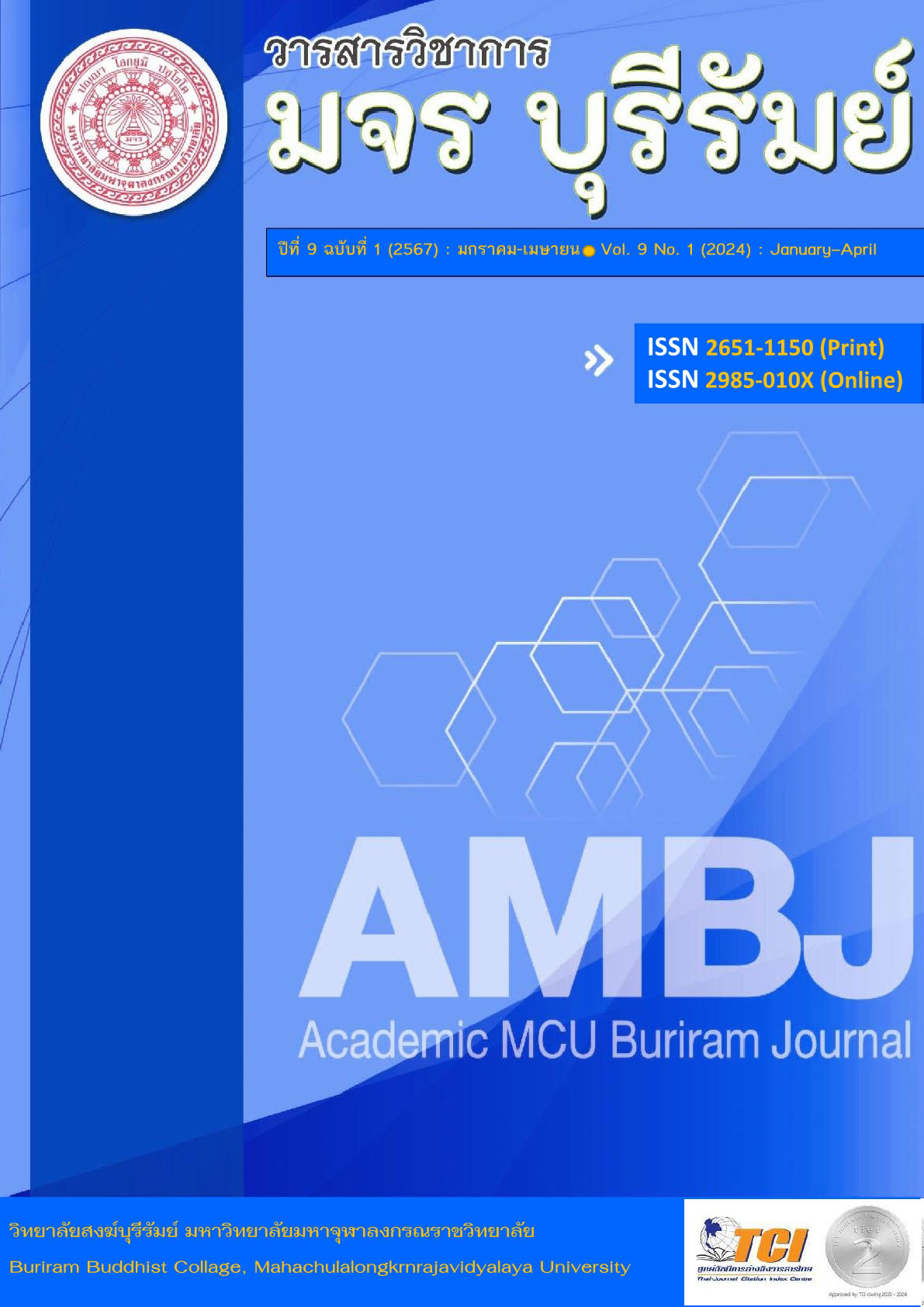Guidelines for Creating Happiness Using Buddhist Principles of the Salakdai Sub-district Community Mueang Surin District, Surin Province
Keywords:
Creating Happiness, Guidelines for Creating Happiness, Buddhist Principle, Salakdai Sub-district CommunityAbstract
The purpose of this research were: 1) study the problems of the Salak Dai Subdistrict community. Mueang Surin District Surin Province 2) study Buddhism regarding creating social happiness in living together and 3) propose guidelines for creating happiness using Buddhist principles of the Salak Dai Subdistrict community. Mueang Surin District Surin Province. This research is qualitative field research. By studying and analyzing information from the Tripitaka, commentary, documents, and related academic works. Then present the information in the form of descriptive and analytical writing.
The research results found that:
- Problems of the community in Salak Dai Subdistrict Mueang Surin District Surin Province found that communities lacked trust in each other. They don't support each other. and lack of unity In particular, some leaders and members lack responsibility for their duties. Not attending the meeting according to the agenda So there are disagreements. causing most members to lack credibility. Sometimes listening to only one side of the news Or they don't understand each other. until leading to conflict and the community lacks mutual support have selfish thoughts exploit compete with each other. In addition, the community also has problems in making a living. Had to struggle hard to find work. It causes a lack of unity.
- The principles of Buddhism related to creating happiness include 1) the 5 precepts, 2) the 4 saṅgaha vatthu, and 3) the 6 Saraniyadhamma.
3. Guidelines for creating happiness using Buddhist principles of the Salakdai Subdistrict community Mueang Surin District Surin Province consists of 1) 5 precepts. It was found that keeping all 5 precepts is complete. can make the community peaceful don't quarrel. Don't create chaos. Because there is no violation of the rights of others. Everyone in the community should view the 5 precepts as basic morality that everyone can practice. And it is the duty of everyone in the community to work together to do so. 2) Principles of Sangha Vatthu 4 found to be good principles of society. Because the community can be built into a society of mutual support. Be generous to each other. Ready to have good wishes for each other It is a Dhamma principle supporting the creation of community unity and 3) Saraniyadhamma Principle 6 found to be a Dhamma principle appropriate to society. Because it can be put into practice appropriately can promote communities to build trust with each other. There is support. understand each other accept each other's differences. There is unity and dependence on each other. and help each other these principles should be promoted and applied appropriately. For the welfare and goodness of the community.
References
ฐานิสร พันธ์ครุฑ. (2562). ความสัมพันธ์ระหว่างความเชื่อมั่นกับความคุ้มค่าในการเข้ารับบริการจากกระบวนการยุติธรรมของประชาชน. วิทยานิพนธ์รัฐประศาสนศาตรมหาบัณฑิต. คณะรัฐประศาสนศาตร์: สถาบันบัณฑิตพัฒนบริหารศาสตร์.
บุญตัน หล้ากอง. (2532). แนวคิดเรื่องการพัฒนาชุมชนในพุทธศาสนา. วิทยานิพนธ์ศิลปศาสตรมหาบัณฑิต สาขาวิชาปรัชญา. บัณฑิตวิทยาลัย: มหาวิทยาลัยเชียงใหม่.
แผนพัฒนาจังหวัดสุรินทร์ พ.ศ. 2561-2565 (ฉบับทบทวน พ.ศ. 2563). (2563). ข้อมูลพื้นฐานทางกายภาพ. กรุงเทพมหานคร: สำนักงานคณะกรรมการข้อมูลข่าวสารของราชการ.
พระณเดช ปคุโณ (สมบรณู ์พร้อม). (2564). แนวทางการพัฒนาชุมชนตามหลักสังคหวัตถุ 4 ของประชาชนชุมชน OTOP บ้านบกหวาน ตำบลค่ายบกหวาน อำเภอเมืองหนองคาย จังหวัดหนองคาย. วิทยานิพนธ์พุทธศาสตรมหาบัณฑิต สาขาวิชาพระพุทธศาสนา. บัณฑิตวิทยาลัย: มหาวิทยาลัยมหาจุฬาลงกรณราชวิทยาลัย.
พระสุทิน จกฺกวโร (ราชวัฒน์). (2563). การประยุกต์ใช้หลักพุทธธรรมเพื่อส่งเสริมสุขภาวะของชุมชน บ้านหนองบัว อำเภออาจสามารถ จังหวัดร้อยเอ็ด. วิทยานิพนธ์พุทธศาสตรมหาบัณฑิต สาขาวิชาพระพุทธศาสนา. บัณฑิตวิทยาลัย: มหาวิทยาลัยมหาจุฬาลงกรณราชวิทยาลัย.
ศิริสุดา ธนาวาณิชยกูล, ปารีญา ราพา และฉัตรวิไล สุรินทร์ชมพู. (2566). ปัจจัยที่มีผลต่อการส่งเสริมและพัฒนาความรักความสามัคคีแบบมีส่วนร่วมของชุมชนหมู่บ้านป่าหม้อ อำเภอพระยืน จังหวัดขอนแก่น. วารสารเสฏฐวิทย์ปริทัศน์, 3(2), 1-11.
สุภาพรรณ ณ บางช้าง และคณะ. (2529). การประยุกต์หลักพุทธธรรมมาใช้ในการพัฒนาชนบท. พิมพ์ครั้งที่ 2. กรุงเทพมหานคร: โรงพิมพ์จุฬาลงกรณ์มหาวิทยาลัย.
สิริวรรณ มิตต์สัตย์สิริกุล. (2565). การประยุกต์ใช้หลักพุทธธรรมในการส่งเสริมสุขภาวะของผู้สูงอายุ จังหวัดน่านในสถานการณ์การแพร่ระบาดของโรคโควิด-19. วิทยานิพนธ์พุทธศาสตรมหาบัณฑิต สาขาวิชาพระพุทธศาสนา. บัณฑิตวิทยาลัย: มหาวิทยาลัยมหาจุฬาลงกรณราชวิทยาลัย.
องค์การบริหารส่วนตำบลสลักได อำเภอเมืองสุรินทร์ จังหวัดสุรินทร์. (2565). สภาพทั่วไป และข้อมูลพื้นฐานขององค์การบริหารส่วนตำบล. เข้าถึงได้จาก http://salakdai.go.th/page.php?pagename=data_detail&id=137 (สืบค้นเมื่อ 5 กันยายน 2565).
Downloads
Published
How to Cite
Issue
Section
License
Copyright (c) 2024 Academic MCU Buriram Journal

This work is licensed under a Creative Commons Attribution-NonCommercial-NoDerivatives 4.0 International License.
ทัศนะและความคิดเห็นที่ปรากฏในบทความวารสารฉบับนี้ถือเป็นความรับผิดชอบของผู้เขียนบทความนั้น ไม่ถือเป็นทัศนะและความรับผิดชอบของบรรณาธิการ





